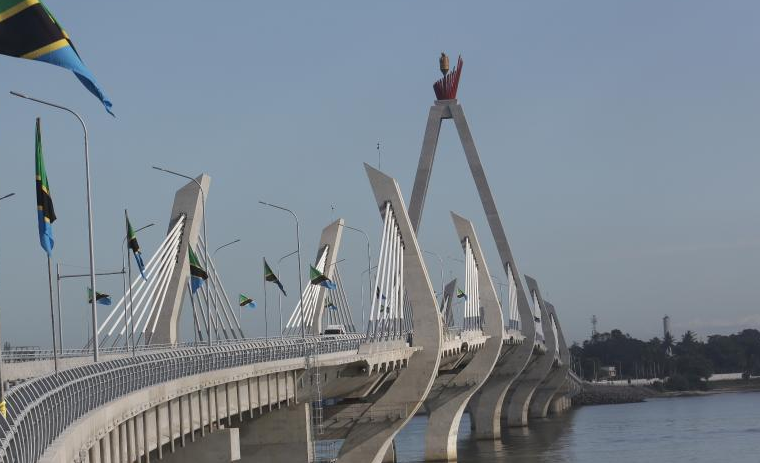
By TZBN Staff
A number of strategic economic development projects in various sectors–including power, roads, water, health and education in Tanzania’s current financial year–will be funded through a Deutsche Bank loan payable within seven years.
A Moody’s Investors Service Rating of B2 Positive on Tanzania has helped the country secure a Euro 300 Million (Tsh. 811,781,347,500/-) loan from the Frankfurt-based Deutsche Bank AG for this purpose, Chief Executive Officer of the African Trade and Investment Development Insurance(ATIDI), Manuel Moses, has told TZBN in a statement.
ATIDI has insured the German bank loan within certainty Tanzania will not default in its repayment obligation.
“In April 2023, Tanzania received Moody’s Investors Service rating of B2 Positive. The positive outlook reflects that political risks have lessened under the government’s new approach of more active engagement with the international community and its structural reform agenda”, Moses has said.
“The [Tanzania] government’s efforts to improve business and investment climate, and attract foreign direct investment, offer the prospect for higher potential growth, government revenue and foreign reserve generation. …The facility has been insured/guaranteed by ATIDI against sovereign default. The Government of Tanzania is one of the founding members of ATIDI and therefore, we don’t anticipate challenges”.

This positive outlook on Tanzania’s future economic performance is also reflected in one International Monetary Fund (IMF) analysis which categorizes Tanzania’s tax – to- GDP ratio as giving the country permission to borrow funds for infrastructure development.
Peter Heller, Former Deputy Director of the IMF´s Fiscal Affairs Department says a government can [source funds for its projects] by raising taxes, securing outside grants, cutting lower priority expenditure, borrowing resources (from citizens or foreign lenders), or borrowing from the banking system (and thereby expanding the money supply).
“But it must do this without compromising macroeconomic stability and fiscal sustainability—making sure that it has the capacity in the short term and the longer term to finance its desired expenditure programs as well as to service its debt”.
The analyst then compares Malawi, Tanzania and Zambia: “On the tax front, only Tanzania would have room for higher taxes, since tax-GDP ratios in Malawi and Zambia are already high by regional standards. Tanzania might also be able to reprioritize spending, but Malawi and Zambia would be constrained by the high share of wages and salaries and interest payments in total spending.
“How about higher concessional borrowing? Tanzania could pursue this route, but Malawi and Zambia would be hampered by high domestic debt levels—and until external debt is brought down to sustainable levels through debt relief, taking on more debt would be questionable. Thus, the best route for all three countries would be more foreign grants”.
The African Trade and Investment Development Insurance(ATIDI) has insured EUR300 million loan facility issued by Deutsche Bank AG to the Government of Tanzania. The facility will finance several infrastructure projects included in Tanzania’s 2022/2023 budget and aligned with the country’s National Development Vision 2025.
The insurer has provided a seven-year comprehensive cover to Deutsche Bank, insuring the lender against non-payment by the Government of Tanzania on the loan facility advanced to the Ministry of Finance and enabling the implementation of 50 identified infrastructure projects as well as rehabilitation and implementation of new ones.
“ATIDI is happy to support viable and impacting projects in Tanzania…. We are looking forward to discussing further transformational projects that will sustainably benefit Tanzania and its people,” ATIDI CEO Manuel Moses said.
Commenting on the Deutsche Bank loan facility, Maryam Khosrowshahi, Co-Head of Africa Coverage, Head of CEEMEA Public Sector Debt Capital Markets, and Chair of Global Sub-Saharan Africa at Deutsche Bank, said the bank was proud to have been selected by the United Republic of Tanzania as their partner of choice on this facility to help fund a number of critical infrastructure projects in the country.
“The successful execution of both tranches within a relatively short timeframe since the start of the transaction is testimony to the Bank’s ability to structure and execute complex and innovative financings in Sub-Saharan Africa. We are grateful to ATIDI for our close cooperation once again on the underwritten tranche,” Ms. Khosrowshahi said.
Tanzania is one of the seven countries – alongside Burundi, Kenya, Malawi, Rwanda, Uganda and Zambia – which founded ATIDI in 2001 in a move to set up a specialized multilateral entity that could authoritatively address African political and other risk issues and attract global investors who perceive African markets as excessively risky.
Since its inception, ATIDI has supported Tanzania in projects valued at over USD3.5 billion in sectors including financial & insurance services, energy & gas, construction, and manufacturing. ATIDI’s contract value in Tanzania stands at USD3.5 billion and a pipeline of over USD900 million to be added in the short-term period, Moses has said in his statement.



